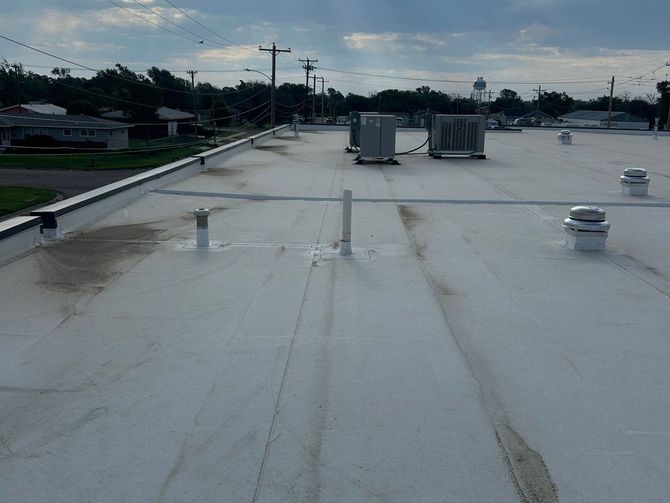When it comes to industrial roofing, choosing the right system is crucial for the longevity and safety of your property. Whether you’re installing a new roof or maintaining an existing one, understanding the different roofing options and their specific needs can save you time, money, and headaches. In this article, we’ll guide you through the essentials of industrial roofing systems and help you make informed decisions about your next roofing project.
Things to Keep in Mind for Your Industrial Roofing Project
Because industrial roofing projects are complex, understanding the unique requirements of your property is essential. Here are the key factors to consider:
- Building Use: The type of building determines roofing needs, whether for heat resistance, weather protection, or soundproofing. Consider the building's use to select the appropriate roofing material.
- Environmental Conditions: Consider your local climate—extreme temperatures, heavy rainfall, or snow can all affect roofing materials. Select a roofing system designed to handle these conditions.
- Budget: Industrial roofing can be a significant investment. Balancing quality with cost-effective options ensures you get the best value for your investment.
- Energy Efficiency: Opting for energy-efficient roofing materials can help lower energy costs by improving insulation and reducing the need for heating and cooling.
Overview of Industrial Roof Types: Built-Up, Metal, and Modified Bitumen
Industrial buildings often use specific roofing systems. Below are some of the most common types that provide advantages based on the structure's needs.
Built-Up Roofs (BUR)
Built-up roofing systems are made of multiple layers of materials, typically tar and gravel, providing excellent waterproofing. BUR is durable, offers good insulation, and can handle harsh weather conditions, making it ideal for large industrial buildings. However, the installation process can be lengthy and labor-intensive.
Metal Roofs
Metal roofing is a durable and low-maintenance option that performs well in extreme weather. Its reflective properties also improve energy efficiency by reducing cooling costs. Metal roofs come in multiple materials, including steel, aluminum, and copper.
Modified Bitumen Roofs
Modified bitumen combines asphalt with rubber or plastic polymers, resulting in a flexible and durable roofing solution for low-slope buildings. Its resistance to leaks makes it a reliable choice for industrial structures.
How to Maintain Your Industrial Roof and Avoid Costly Repairs
Routine maintenance is vital to ensuring your industrial roof lasts longer and avoids expensive repairs. Here’s how to maintain your roof effectively:
- Regular Inspections: Schedule professional roof inspections at least once a year to identify any issues early, such as cracks, leaks, or debris buildup.
- Clean Gutters and Drains: Keep gutters and drains free of debris to avoid water accumulation that could damage your roof.
- Prompt Repairs: Address any issues quickly to prevent further damage. Delaying repairs can result in larger, more expensive problems later.
- Coating and Sealing: Applying coatings and sealants to your roof helps guard against moisture and UV damage, prolonging its lifespan.
The Importance of Hiring a Specialized Roofing Contractor
Hiring a specialized roofing contractor is essential for ensuring your roof is installed correctly and maintained properly. Experts can help you choose materials, manage the project, and provide long-term support.
Conclusion: Industrial Roofing That Meets Your Business Needs
Selecting the right industrial roof is key to safeguarding your property and ensuring it lasts long-term. Understanding your options—BUR, metal, or modified bitumen—will guide your decision. With a specialized contractor, you can ensure optimal installation and maintenance for years of protection.
Looking for a trusted roofing partner for your industrial needs? Reach out to us today for tailored roofing solutions and expert guidance!

#IndustrialRoofing #CommercialRoofing #RoofInstallation #BuiltUpRoof #MetalRoofing #ModifiedBitumen #RoofMaintenance #EnergyEfficientRoofing